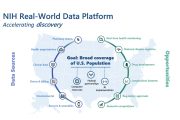
Apparently not content with medicating more than one out of every five Americans with mind-altering and potentially dangerous psychiatric drugs, the Big Psychiatry and Big Pharmaceutical industries are working to promote their latest invented “mental disorder” supposedly requiring their benevolent and costly assistance: Being too concerned about eating healthy. Calling the proposed new “disorder” orthorexia nervosa, the increasingly discredited establishment press has so far been more than happy to unquestioningly parrot the notion that people deeply concerned with eating healthy and nutritious food are somehow “ill” and in need of expensive “treatment.” As public knowledge of toxins in processed food and genetic engineering spread, the “disorder” is apparently surging in tandem.
The dubious diagnosis of so-called “orthorexia,” which translates roughly into righteous or correct eating, was first proposed by Dr. Steven Bratman in 1997. He originally defined it as “an unhealthy obsession with eating healthy food.” Outside of psychiatry, it was largely ignored or ridiculed. Even many psychiatrists balked as the whole industry faced increasing scrutiny over its accelerating efforts to expand the list “mental disorders” by just making more up — along with expanding the potential pool of “patients” in need of supposed “treatment.” A handful of articles discussed it over the years, including a 2005 piece in the state-funded BBC and a 2011 article in the Huffington Post.
Starting late last year, though, almost certainly with an expensive public-relations propaganda campaign operating behind the scenes, Bratman’s alleged “disorder” gained a great deal of traction in the establishment press. Indeed, inside a period of just a few months, the Wall Street Journal, CNN, ABC News, and other media outlets all began hyping the supposed “disorder” as if it were a totally legitimate disease that had just been discovered and was fast becoming another scourge on mankind. All of the articles indicated that the alleged condition was on the rise, failing to mention growing awareness about widely distrusted genetically modified organisms (GMOs) and various toxins often found in processed foods. Just 37 percent of Americans think genetically engineered food is generally safe to eat, according to a recent survey.
In the media, though, “orthorexia” was treated as deadly serious. The Journal, for example, called it “a little-researched disorder,” and claimed that researchers were coming up with “criteria” for clinicians to “diagnose orthorexia.” ABC News even found an eccentric 23-year-old woman whose “perfectionism” surrounding food had supposedly “morphed into a full-blown eating disorder called ‘orthorexia nervosa.’” Not to be outdone, CNN claimed: “There’s now a name for people dangerously addicted to all things healthy — a sufferer of orthorexia nervosa.” Popular Science, Fast Company, and other media outlets also began hyping the supposed disorder. Despite all of the hysteria, however, there seems to be little agreement on what precise combination of seemingly arbitrary “symptoms” must be exhibited to qualify.
In traditional medicine, objective biological diagnoses can be made because there are real medical problems being dealt with — a broken bone on an x-ray, a bacterial infection, and so on. With “orthorexia,” though, like virtually all of modern psychiatry, there are no objective criteria or biological tests. Indeed, psychiatrists actually vote regularly to literally invent or redefine supposed diseases, “symptoms” that go with their newly created “disorders,” and what drugs ought to be used to treat them. While what critics call the latest “quackery” has not yet been formally added to the ballooning “bible” of psychiatry known as the Diagnostic and Statistical Manual of Mental Disorders (DSM), the recent PR campaign appears to be setting the stage for its eventual inclusion.
Even the DSM, though, is coming under increasing fire. Duke University psychiatry professor Allen Frances, who served as the lead editor of the fourth edition of the American Psychiatric Association’s DSM, explained that “there is no definition of a mental disorder.” In fact, “it’s bull****,” he said as he attacked the very foundations of psychiatry’s “diagnostic” tool. “I mean, you just can’t define it.” “The DSM is distinct from all other diagnostic manuals because it has an enormous, perhaps too large, impact on society and millions of people’s lives,” explained Dr. Frances, who also worked on previous editions of the manual. “Unlike many other fields, psychiatric illnesses have no clear biological gold standard for diagnosing them.”
In 2012, as the DSM was being updated and packed with new and improved labels, the problems only grew. In an unprecedented rebellion, 13,000 mental health professional from around the world were so outraged at what they saw that they attacked it publicly in an open letter calling for the manual to be put on hold and reconsidered. “[The DSM] is wrong in principle, based as it is on redefining a whole range of understandable reactions to life circumstances as ‘illnesses,’ which then become a target for toxic medications heavily promoted by the pharmaceutical industry,” clinical psychologist Lucy Johnstone with a Health Board in Wales told Reuters at the time. “The DSM project cannot be justified, in principle or in practice. It must be abandoned so that we can find more humane and effective ways of responding to mental distress.”
For the psychiatric and pharmaceutical industries, however, the DSM and its perpetually mushrooming list of invented “disorders” means big money. In a widely reprinted report first published by the Natural Society, journalist and researcher Jefferey Jaxen lambasted the drive to label those concerned about healthy eating as mentally disordered. Suggesting it was an establishment attempt to curb growing consumer demand for healthy and nutritious food, Jaxen also attacked the psychiatric industry and its close relationship with the pharmaceutical industry as an unholy alliance aimed at fleecing consumers by inventing more “disorders” to be treated with their “toxic products” as the supposed answer.
“The cherry on top is that if you have the pseudo-science labeled disorder of orthorexia nervosa, you will be prescribed known toxic, pharmaceutical drugs from some of the same conglomerate corporations that you are trying to avoid by eating healthy in the first place,” he wrote, pointing out that efforts are underway to label even creativity as a mental disorder. “As the people continue to walk away from the broken medical and agricultural/food systems like any abusive relationship, the food makers are willing to do anything to maintain their waning control…. Perhaps some people to take it too far to the point of self-harm, but the problem we face with a toxic food system is a much larger threat.”
Indeed, beyond what critics say is wild overmedication and over-diagnosing of “mental disorders,” some experts have raised an even more troubling specter. As The New American reported in 2012, former U.S. Marine Brandon Raub was detained in a psychiatric ward by law enforcement over anti-government Facebook posts. “The police state is here,” explained John Whitehead, president of the Rutherford Institute, about Raub’s case. “For government officials to not only arrest Brandon Raub for doing nothing more than exercising his First Amendment rights but to actually force him to undergo psychological evaluations and detain him against his will goes against every constitutional principle this country was founded upon. This should be a wake-up call to Americans.” Of course, the mass-murdering regime ruling the Soviet Union became infamous for its use of “psychiatry” and quack diagnoses to disappear and discredit political opponents.
While there may indeed be a tiny handful of people who are what most would consider “too” concerned about healthy eating, critics of the effort to make “orthorexia” into a “mental disorder” said the issue highlights a growing and troubling trend. DSM-IV lead editor Dr. Frances, for example, warned years ago that the overly broad and vague definitions of “disorders” would create more “false epidemics” and increase the “medicalization of everyday behavior.” His motivation for speaking out, he wrote in Psychology Today, was to prevent “diagnostic inflation” that would result in the “mislabeling of millions of people as mentally disordered.”
As psychiatry increasingly seeks to label any and all emotions, beliefs, and actions as “disorders,” healthy eaters and the general public ought to be paying attention. If the industry and its Big Government allies are left unchecked, Americans may wake up one day to find that they, too, have some newly invented “mental disorder.”
Alex Newman is a correspondent for The New American, covering economics, education, politics, and more. Follow him on Twitter @ALEXNEWMAN_JOU. He can be reached at:
Related articles:
Critics Blast Big Psychiatry for Invented and Redefined Mental Illnesses
Research: Antipsychotic Meds Cause Hopelessness, Zombie-Like State
Former Marine Held in Psychiatric Hospital Over Facebook Posts Questioning Govt.
GMO Giant Monsanto Joins Big Business Coalition for UN Agenda 21
Psychiatric Meds: Prescription for Murder?
Using “Mental Health” to Take Away Guns
UN Seeking Global “Mental Health” Plan
Are Mental Health Professionals Working to Normalize Pedophilia?
Could California Parents Lose Rights to Help Homosexual Children?
Is the APA Playing Politics With Sexual Disorder Definition?
Russia Bans GMO Corn Over Cancer Fears as Pressure Builds on Monsanto
France Responds to Study of GMOs That Shows Links to Tumors and Organ Damage
Psychiatric Group Backtracks on Pedophilia Classification




